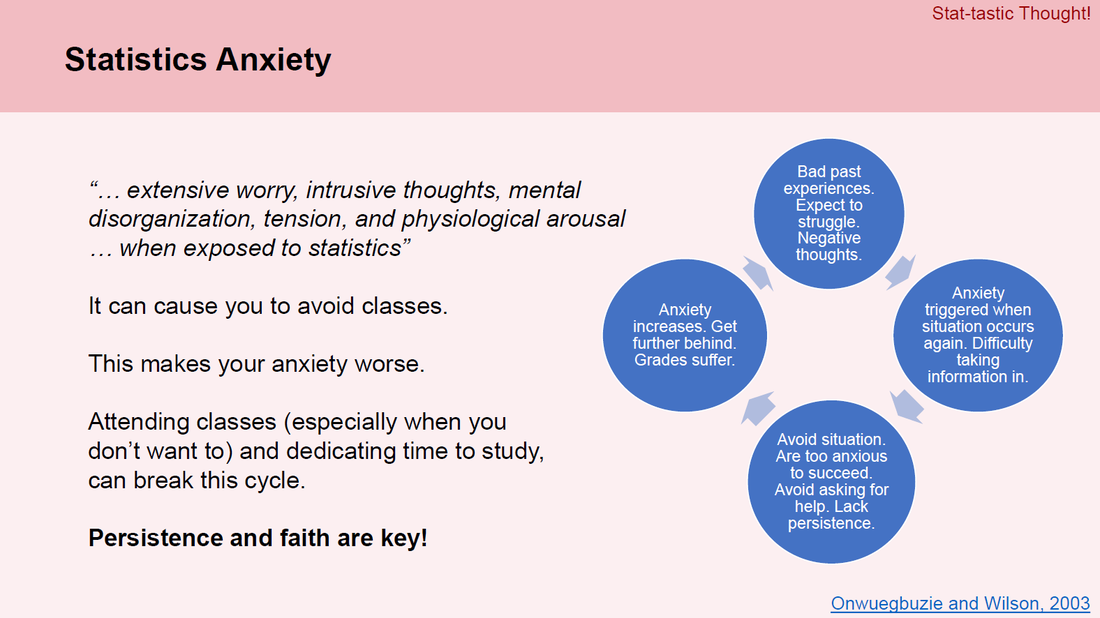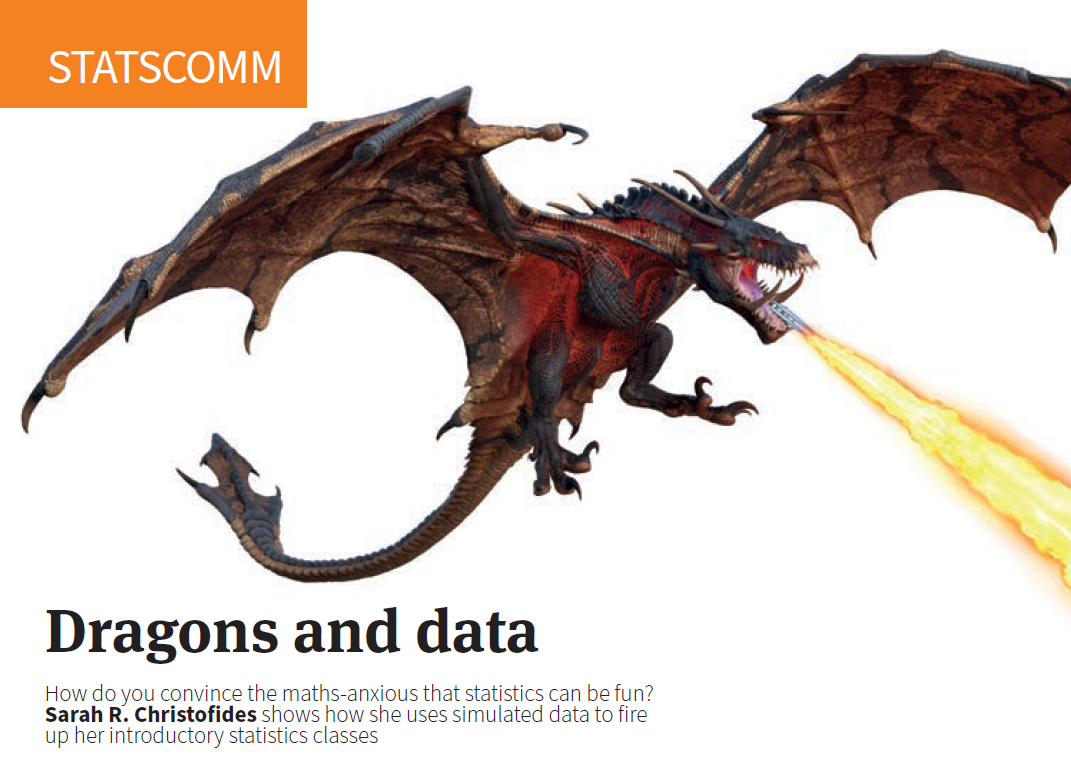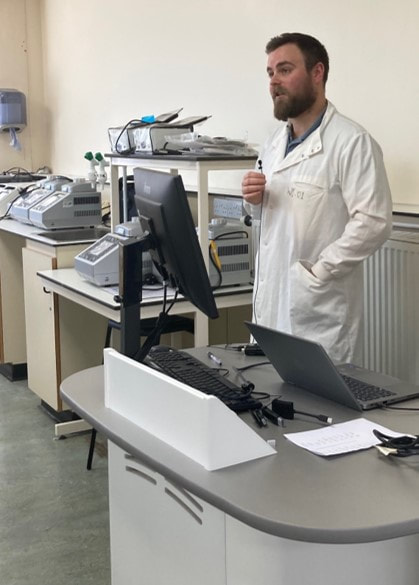“Education is the most powerful weapon which you can use to change the world.” - President Nelson Rolihlahla Mandela
|
Educational Research
My main area of focus in terms of pedagogic scholarship and research is in the concept of "Statistics Anxiety", and mitigating and combatting this for our students. More broadly I am interested in what makes for an effective learning environment for learning statistics, including determining the effectiveness of statistics support through drop-in Data Clinics. I am also interested in how we build a sense of community among students and staff. My current research avenues involve (i) assessing the landscape of statistics tuition in UK HE institutions, (ii) incorporating novel teaching strategies into statistics lectures, (iii) designing new statistics learning aids (e.g., “Statistics Shorts”), (iv) developing methods to increase retention of statistical knowledge, (v) devising novel ways to embed statistics tuition into biology practicals and assessments, and (vi) self-regulated learning. I was extremely pleased to win the 2023 UK and Ireland Mathematics and Statistics Support Networks Award for Excellence (presented at the CETL-MSOR Conference).
The Landscape of Statistics Tuition in the Life Sciences
|
Cardiff University
|
Collaborators: Dr Crispin Jordan et al.
|
|
This project aims to improve statistics and study design teaching in the Life Sciences. We will provide practical suggestions for improvement, with an eye on increasing reproducibility in Life Sciences research and benefitting student outcomes and employability. We are using interviews informed by survey data to identify best practice in teaching quantitative study design and data analysis. This includes identifying barriers experienced by lecturers, as well as the costs and benefits associated with diverse teaching strategies.
|
Stat-tastic Thoughts!
|
Cardiff University
|
We have previously found that presenting students with content that raises awareness of statistics anxiety in a two-hour workshop, reduces statistics anxiety. However, we know there are students who are too anxious to attend such workshops (Marshall et al., 2022). Attempts to deliver workshops as part of a timetabled class within a module have the advantage of reaching all students who are anxious about statistics. The disadvantage is that students who have positive feelings towards statistics may see little benefit in a whole hour of contact time being used for such a workshop. In this multi-institutional study, lecturers presented the statistics anxiety awareness content one slide per lecture or practical throughout a subject, in order to reach those that need it while not exasperating those that do not. Crucially, the effect of the “Stat-tastic” slides was compared to other features of teaching that the literature suggests lecturers can implement to reduce statistics anxiety, such as the use of humour, collecting own data, or being approachable. Some of our results surprised us and are useful for other statistics teachers deciding what aspects of their teaching to focus time and energy on to reduce anxiety. We also reflect on our experience of pre-registering our study, the challenges of undertaking studies across multiple universities and the advantages this brings to the quality and applicability of pedagogical research.
Statistics Shorts
|
Cardiff University
|
Collaborator(s): None
|
|
|
Statistics is a key skill for bioscience students, but for this demographic learning statistics is notoriously challenging. Many students suffer from "statistics anxiety", and tackling this (major) barrier to learning is hence a priority. Screencast tutorials have been shown to be an effective tool to enhance student learning of statistics by promoting participation, although classically such video tutorials are long (≥ 10 mins), which may not maximise engagement. Video tutorials less than 10 minutes in length – including “Shorts” or “Reels” of no more than 90 seconds (as seen on popular social media platforms) – are perceived as more entertaining. Thus, introducing, "Statistics Shorts".
|
Retention of Statistics Knowledge
|
Cardiff University
|
Collaborator(s): Dr Sarah Christofides
|
|
In this project, Sarah and I are encouraging students to undertake optional exercises in statistics over summer between successive years of an undergraduate degree. We are aiming to understand if engagement with such material can improve the retention of statistics knowledge and skills from year to year. We are making use of Sarah's fantastic dragon ecology (simulated!) dataset for this project.
|
Embedding Statistics in Biology Practicals and Assessments
|
Cardiff University
|
Collaborator(s): Dr Zoe Prytherch
|
|
Providing authentic learning opportunities and developing an authentic learning environment are key for biology students studying statistics. In this project I am developing innovative approaches to integrate statistics into biology practicals and assessments, in order to facilitate authentic learning and contribute to the development of a spiral curriculum for statistics. The first approach is embedding live statistics tuition into undergraduate laboratory practicals, during which students generate biological data which I assist them to analyse in real-time, providing a personalised learning opportunity. The second is in incorporating statistics-related questions into Skills-Based Assignments designed to support Assessment for Learning. Feedback received from students and staff suggests these approaches facilitate a more inclusive and collaborative learning environment, generates higher levels of motivation, and supports the development of high-level learning.
|
Self-Regulatory Approaches to Assessment and Feedback
|
Cardiff University
|
Collaborator(s): Evans et al., 2024
|
Students need to acquire high level self-regulatory skills if they are to be successful within higher education, and academics need support in facilitating this. In this work we explored how the research gap between knowledge of self-regulatory assessment and feedback (SRAF) practices, and academics' professional training in it can be bridged. Students need to acquire high level self-regulatory skills if they are to be successful within higher education, and academics need support in facilitating this. In this article we explore how the current research gap between knowledge of self-regulatory assessment and feedback (SRAF) practices, and academics' professional training in it can be bridged. SRAF tools were used with academics to explore their understandings of and training needs in SRAF; central to this work was the development of a SRAF scale. We considered the value of such tools in supporting academics' professional development needs in SRAF. The reliability and validity of the SRAF scale was tested using exploratory factor analyses (EFA). Iterative EFA resulted in a 17 item support required SRAF scale (SR). Two underpinning factors: Creating the Conditions for SRAF, and Supporting Students' SRAF Skills Development were identified. The reliability of the instrument supported its primary use as a tool to facilitate academics' professional development in fostering students' self-regulatory skills. Our findings highlight the importance of supporting academics in developing strategies to maximise students' metacognitive skills and motivation in assessment and feedback, contingent on effective assessment design. Such professional development needs to be mindful of individual and contextual factors impacting academics' access to, and confidence and competence in, using SRAF in practice. This research is important in highlighting potential disconnects between where academics' focus their attention in assessment, and what is known to have most impact on student learning success. The SRAF tools have considerable potential in supporting translation of theory into practice as part of sustained professional development for academics in higher education.
Statistics Support Tools: Developing a Discipline-Specific Question Bank
|
Cardiff University
|
Collaborator(s): Dr Thomas Malcomson, Dr Elizabeth Chadwick
|






